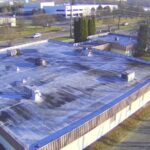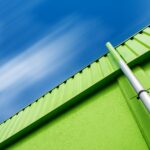
Essential Fire-Resistant Commercial Roofing for Safety and Compliance
For commercial building owners, safety is a top priority—not only to protect valuable assets but to ensure compliance with building codes and provide peace of mind for tenants and clients. Choosing fire-resistant commercial roofing options can be one of the most effective measures to enhance protection and avoid costly damage. However, choosing the right material can feel overwhelming, especially with so many options available. In this article, we’ll guide you through the selection process, helping you make an informed choice that balances safety, cost, and durability.
Understanding Fire-Resistant Roofing
Basically, these materials are engineered to withstand extreme heat and resist ignition, offering an essential layer of protection for buildings. By preventing or slowing the spread of fire, they can help minimize structural damage, protect valuable assets, and safeguard those inside the establishment.
Fire-resistant commercial roofing materials are typically categorized into Class A, B, and C ratings:
- Class A: Those offer the highest level of protection, as they are able to withstand severe exposure to fire for extended periods without igniting or spreading flames.
- Class B: This rating means moderate fire protection, with materials that can resist surface burning for a limited time.
- Class C: These materials provide the minimum level of fire resistance, able to endure only light fire exposure before igniting.
In commercial settings, Class A fire-resistant roofing is generally recommended, as it offers a higher level of safety and many other benefits.
Key Benefits of Fire-Resistant Roofs
- Enhanced Safety: Fire-proofing your roofs reduce the risk of flames spreading from external sources, protecting your building and its occupants.
- Insurance Premium Reductions: Many insurance companies offer lower premiums for properties with fire-rated roofing systems, as they present a lower risk.
- Compliance with Building Codes: Many local regulations require specific fire-resistance ratings for roofing materials, particularly in commercial properties.
- Increased Property Value: Fire-resistant roofs can enhance the overall value of your property, making it more appealing to potential buyers or tenants.
Types of Fire-Rated Roofing Materials
Here are some popular fireproof roofing materials suitable for commercial buildings:
- Metal Roofing
Metal roofs are highly fire-resistant and can effectively reflect heat away from the building. They have a high fire rating, making them an excellent choice for commercial properties.
Benefits:- Long-lasting and low maintenance
- Reflective properties enhance energy efficiency
- Modified Bitumen
These roofing systems often include fire-resistant additives that enhance their safety. This option is ideal for low-slope roofs and offers solid weather protection.
Benefits:- Easy installation
- Good waterproofing capabilities
- TPO and PVC Roofing
Thermoplastic Olefin (TPO) and Polyvinyl Chloride (PVC) membranes have fire-resistant properties and can be highly effective in commercial applications. These materials are also energy-efficient and recyclable.
Benefits:- Lightweight and easy to install
- UV resistant and energy-efficient
Meeting Building Code Compliance for Roofing
When selecting roofing materials, it’s crucial to ensure compliance with local building codes. Many areas have strict regulations regarding fire safety and roofing materials, especially for commercial buildings.
- Understand Local Regulations: Familiarize yourself with your area’s building codes related to fire safety and roofing materials.
- Consult with Experts: Engaging a knowledgeable roofing contractor can help you navigate compliance requirements and select the right materials.
- Regular Inspections: Schedule regular roof inspections to ensure ongoing compliance and address any potential issues before they escalate.
Commercial Fire Safety Practices
In addition to installing fire-resistant roofing materials, consider implementing the following fire safety practices:
- Regular Maintenance: Routine inspections and maintenance can help identify potential fire hazards, ensuring your roofing system remains in good condition.
- Firebreaks and Barriers: If applicable, create firebreaks and barriers around your property to prevent the spread of fire.
- Educate Employees: Train staff on safety practices and emergency procedures to ensure everyone knows what to do in case of a fire.
Securing Your Building’s Future
Investing in fire-resistant commercial roofing options is a critical step toward ensuring the safety and longevity of your building. By selecting the appropriate fire-rated materials, you not only enhance safety but also comply with local regulations and potentially lower insurance costs. At Silicoat Roofing, we specialize in providing expert guidance on the best fireproof roofing materials for your commercial property.
Ready to enhance your building’s safety? Contact us today for a consultation and let our experts help you choose the best fire-resistant roofing options for your needs


 Previous Post
Previous Post Next Post
Next Post